Reading Suggestion: “Inclusion and Exclusion in the Art World: A Sociological Account of Biennial Artists and Audiences” – Christian Morgner
27 September 2020Explore Yokohama Triennale 2020 from Home with a Virtual Tour
3 October 2020Sunjung Kim (SJ) is the current President Gwangju Biennale Foundation supervising the 13th Gwangju Biennial titled “Minds Rising, Spirits Tuning” curated by Artistic Directors Natasha Ginwala (NG) and Defne Ayas (DA). They have responded to our questions regarding the conditions of producing a Biennial during the current pandemic in the past months.
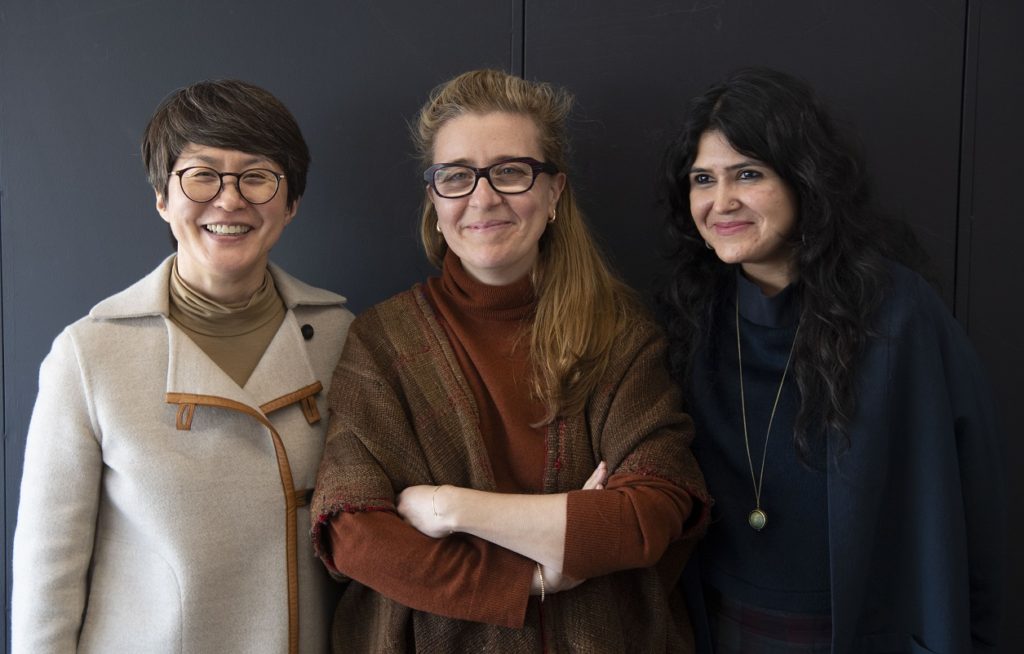
From left: Sunjung Kim, Defne Ayas, and Natasha Ginwala, courtesy of the Gwangju Biennale Foundation
(IBA) Can you give an account of what the situation is with your project and how the crisis affected it?
DA + NG: Our exhibition concept around Minds Rising, Spirits Tuninghas taken into view different forms of intelligence. Now more than ever, the hierarchy of knowledge is being shaken as planetary forces compel a rethinking toward the ‘communal mind.’ The need for learning from the wisdoms of indigenous cultures, Shamanic practices, matriarchal models of society is growing more than ever. We are concerned with what sort of civic models and practices of care will emerge in the aftermath of COVID-19, starting from South Korea.
On a practical level, we had to make the decision to postpone the biennale for about six months, as there are many challenges surrounding the transportation of artworks and international travel. That is despite the optimism and swift measures experienced in South Korea. From our end, we are continuing to prepare for the 13th Gwangju Biennale: taking it day by day, monitoring the situation with the pandemic closely as well as quarantine protocols on a daily basis, along with our team members spread across vast distances between South Korea, Germany, Sri Lanka, Hong Kong, Indonesia, France and Italy. For us, it has also remained a challenge to adapt to Korean institutional bureaucracy and daily planning operations while working long-distance especially. Our approach has been to bridge online and offline activities that extend the curatorial premise for Minds Rising, Spirits Tuning.
Our bilingual online journal Minds Rising was launched with our postponement announcement, which assembles our research processes, featuring interdisciplinary content and artistic ideas. We had planned this way before the pandemic as part of a broader strategy. The first issue features topics from the history of women’s lives in Gwangju to indigenous archaeology to technology and algorithmic gender violence.

Ana María Millán, Happy People, 2020, animation, detail, commissioned by the 13th Gwangju Biennale, courtesy of the artist
(IBA) Did this impact the way you chose to work with the artists?
DA + NG: We still remain committed to realize site-responsive and historically conscious commissions for the 13th Gwangju Biennale adding to the legacy of this remarkable cultural platform. We have been mainly building on recent group research visits to South Korea with participating artists, but we also face the impossibility of certain artists conducting site-based research for new productions not only in Gwangju, but three international artists also needed to commute to Jeju and this has been stalled. We hope to resume their visits once the borders re-open. At this time, it remains crucial for us to learn directly from artistic experiences—to observe with them how vulnerability, loneliness, narrative building and imaginative leaps are reshaping our present lives in confinement and grief.
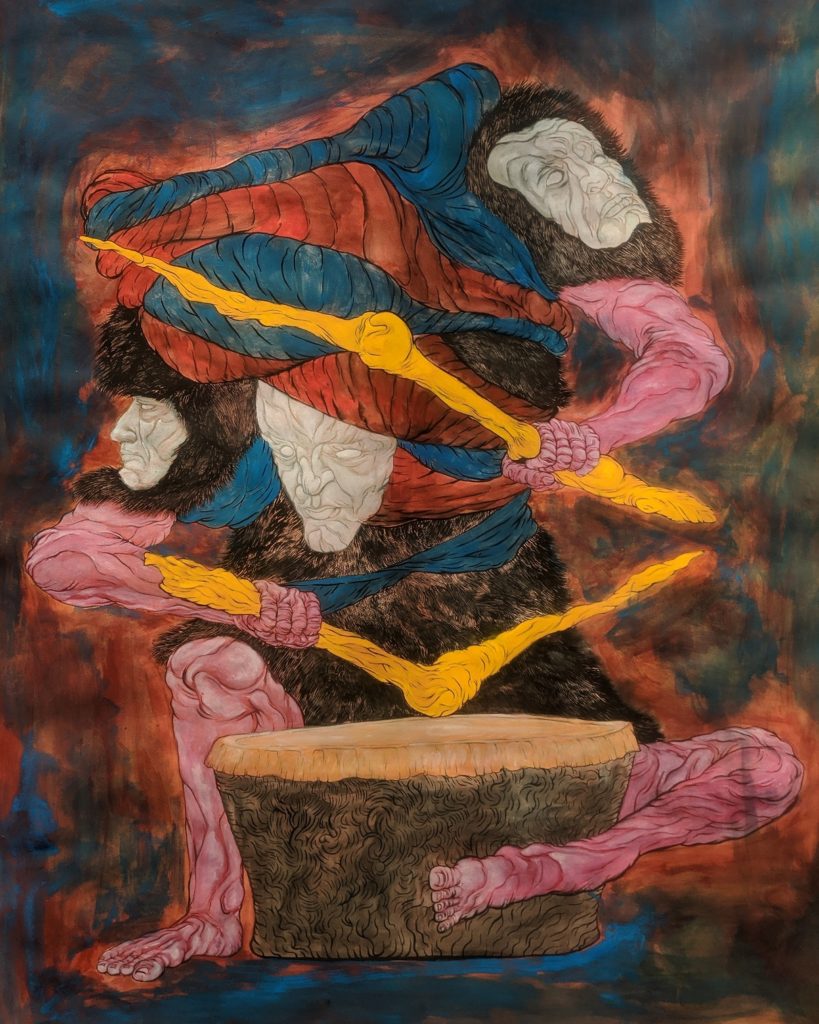
Sahej Rahal, Missing Pages, 2020, ink, pigment, acrylic & watercolor on paper. Courtesy of the artist and Chatterjee and Lal
(IBA) Can you see this not only as a challenge but also as an opportunity to strengthen your focus on your local environment?
DA + NG: We have been in dialogue with biennale colleagues from Sao Paolo, Liverpool, Berlin, Kochi and elsewhere to discuss precisely what makes these recurring formats viable and relevant through an impasse such as this. Since the embarking on this process of biennale-making, we have in fact been thinking about the longer-time significance that artistic projects can assume in the ‘afterlife’ of a biennale, for us the live dialogues generated through art commissions, collaboratively produced artistic works, the inclusion of performative gestures and scientific positions, research visits to Korea with over ten artists contributing to local programming since last year.
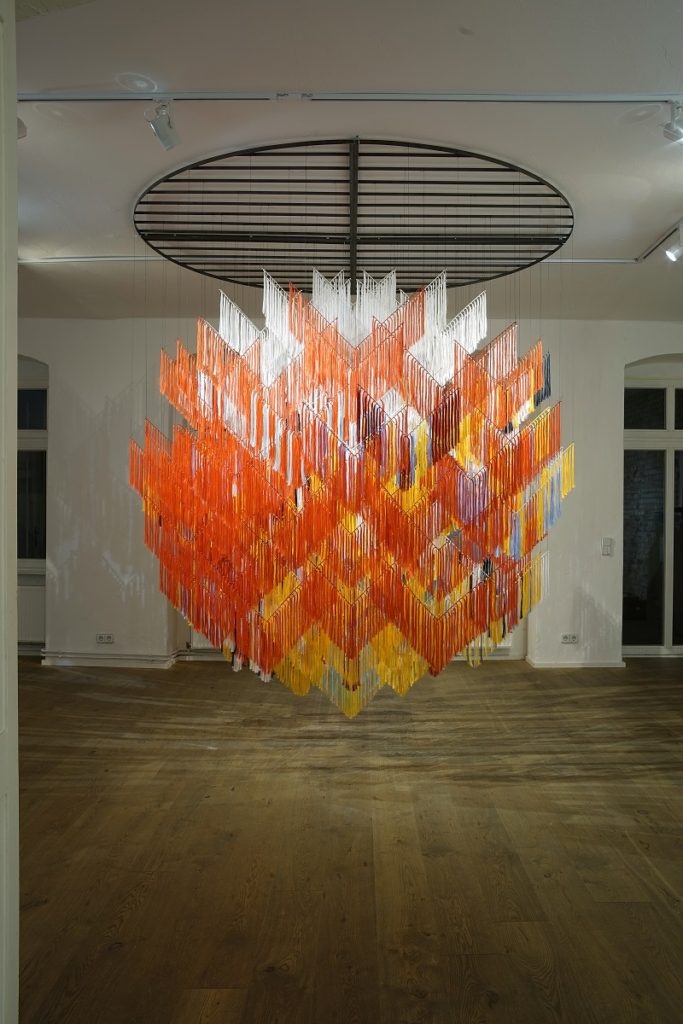
Pieski, Outi, Beavvit/ Rising Together, 2019, installation: metal, thread, courtesy of the artist
(NG) Having worked as an independent curator for a decade now, collaborating with museum-scale institutions as well as a project spaces that are apartment-scale, my role has demanded versatile and imaginative treatment with limited means. One realizes that inevitably certain issues that present themselves in smaller biennales can also recur at one of the largest biennale’s in the world such as Gwangju Biennale—therefore, the experience one brings needs to include far more than artistic insights, such as team building, editorial knowledge, and a deep interest in engaging with local communities. Besides my role at the Gropius Bau, Berlin, I’m currently leading a non-profit arts festival, Colomboscope in Sri Lanka, which has brought on important lessons on working resourcefully through socio-political turmoil and encouraging contemporary cultural dialogues in a post civil war society.
(DA) Back in 2015 at the Moscow Biennale, my co-curators and I decided to scrap everything that makes exhibitions today so expensive — crated air transports, insurance and heavy production — and instead to invest the limited budget in people and capacity-building, asking artists to be present in a variety of the capacities they may offer, not only for the installation of art works in situ. We opted for a radical format and changed the biennale’s structure: condensing it into ten days, with artistic, discursive and reflective moments to shape the space. In Baltic Triennale in 2012, my co-curator and I had chosen to present the contributions of artists through a radically minimized vessel: a single human being. Yes, a single human being instead of the white cube, who appeared each day throughout the Triennial, animated by different instructions, scripts, scenarios, and scores by the participating artists.
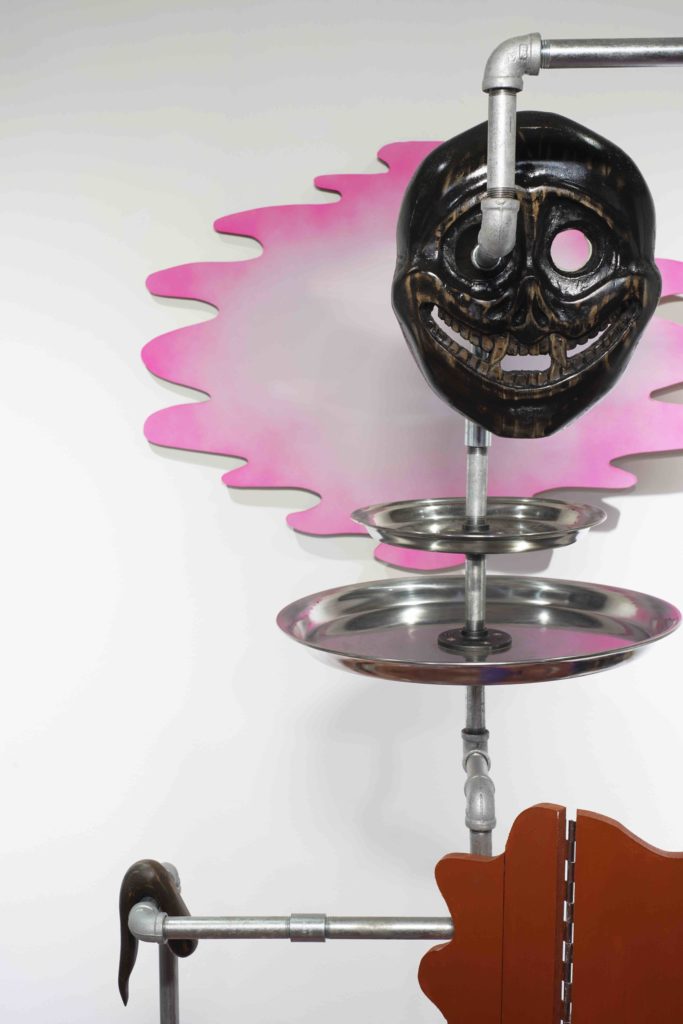
Sangdon Kim, You and I, New Tribe – King Mountain Eagle Crocodile, 2017, mixed media, 200x70x50cm, courtesy of the artist
(IBA) As an institution that interacts more than others with the wider urban fabric do you feel this can also be a moment to re-think a “neighbourhood” relationship with the audience?
SJ: Yes, I do. Since appointed as president of the Gwangju Biennale Foundation in 2017, I have been thinking a lot and deeply especially about local audience. The Biennale takes place every two years, but the Foundation continues to organize public programs focused on Gwangju citizens’ participation and involvement. We started Artist Studio Visits in collaboration with artists based in Gwangju, and GB Talks which invite scholars from outside the city to give lectures and discussions with the local audience. Those monthly programs have been inspired by the Monthly Gathering, initiated by Maria Lind in 2016 for the 11th edition of the Gwangju Biennale. In 2021, we will begin a new program tentatively titled School, which will comprise of workshops led by Gwangju Biennale participating artists through which the participating local students can meet the international artists and learn about their work and contemporary art issues and concepts. We are hoping it will be opportunities for all of us to improve creative and critical thinking skills in playful ways. Currently due to COVID-19, we are also trying to develop online programs and considering ways to connect with the local audience through “untact” methods.
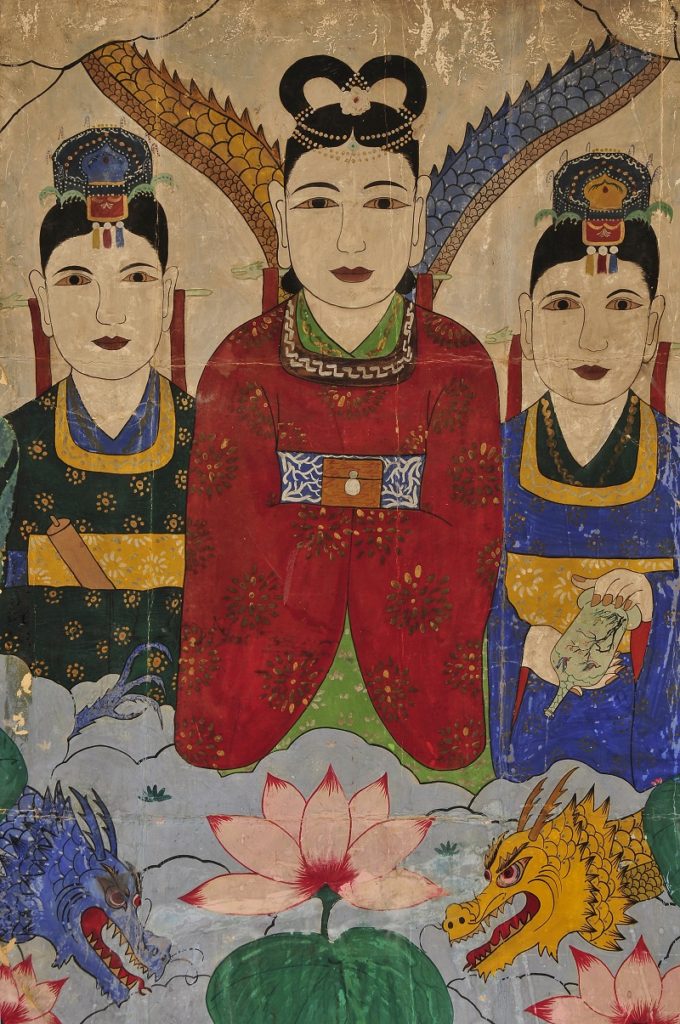
Dragon God, color on paper, 92x72cm, Courtesy of Gahoe Museum
(IBA) Is this also an opportunity to reflect on the sustainability of the model in the long term?
SJ: Given the nature of the biennale, biennales are organized and perceived as a one-time event. But, yes, we can turn this crisis into an opportunity to develop sustainable programs. As part of our efforts on sustainability and long-term vision, in 2018 the Gwangju Biennale Foundation started the GB Commissions, which commissions artists to produce new works in Gwangju inspired by the city; if possible, the works are acquired by the Foundation and used for research and educational purposes as well. For the upcoming edition, we have been discussing about adding to the Foundation’s collection with works by Korean and Asian artists.

Patricia Domínguez, Madre Drone, 2019, digital photograph made at Refugio Biotermal, Roboré, Bolivia, courtesy the artist
(IBA) Can you give us an example/idea about how the IBA network represents a resource in these circumstances?
SJ: The IBA provides a network and productive grounds through which biennale makers from around the world can connect and grow together by learning from one another and by discussing imagining together about the future of biennales.
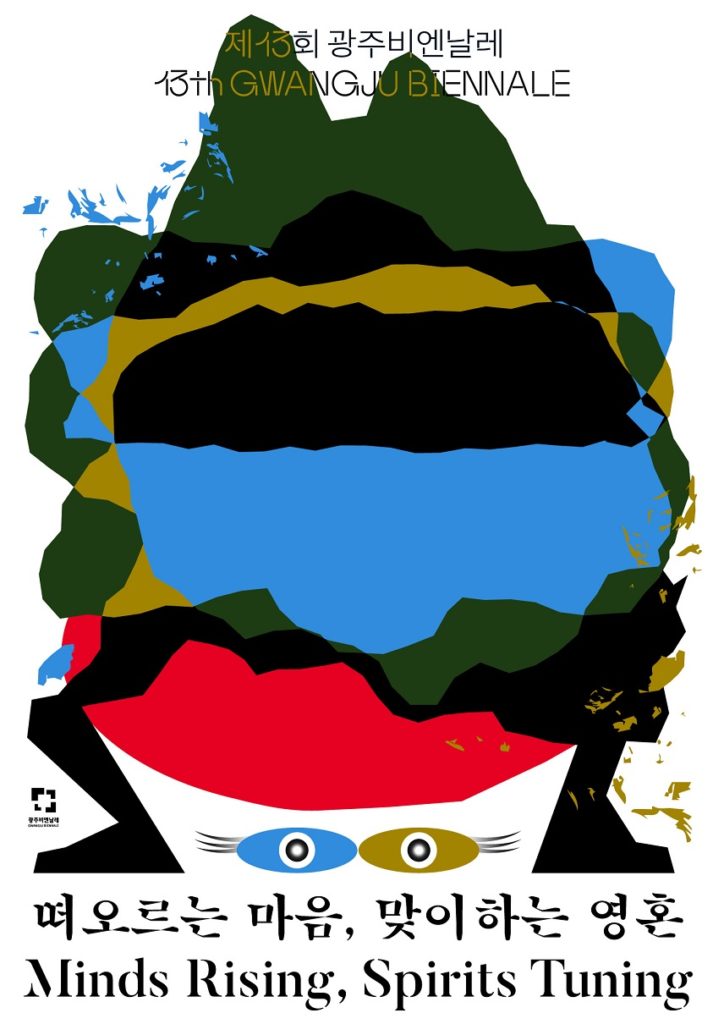
13th Gwangju Biennale: Minds Rising, Spirits Tuning, Graphic Identity: WORKS, Seoul with Studio Remco van Bladel, the Netherlands, courtesy of the Gwangju Biennale Foundation
(IBA) Has this situation sparked a support in your region for artists/art institutions? and as a follow up have you undertaken direct measures in this sense?
SJ: Yes, there have been discussions about how to support artists and art institutions in this difficult time. Hopefully more concrete policies will soon be drafted and put into practice.



